|
|
|
Sort Order |
|
|
|
Items / Page
|
|
|
|
|
|
|
| Srl | Item |
| 1 |
ID:
173918
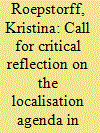

|
|
|
|
|
| Summary/Abstract |
Calls for a greater inclusion of local actors have featured for some time in debates on how to make humanitarian action more efficient and address unequal power relations within the humanitarian system. Though the localisation agenda is at the core of current reform efforts in the humanitarian sector, the debate lacks a critical discussion of underlying assumptions – most strikingly, the very conceptualisation of the local itself. It is argued that the current discourse is dominated by a problematic conceptualisation of the local in binary opposition to the international, leading to blind spots in the analysis of exclusionary practices of the humanitarian sector. As such the localisation agenda risks perpetuating the very issues it wants to redress. A critical localism is thus proposed as a framework for much needed research on the localisation agenda.
|
|
|
|
|
|
|
|
|
|
|
|
|
|
|
|
| 2 |
ID:
173917
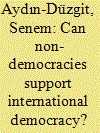

|
|
|
|
|
| Summary/Abstract |
In recent years, there has been a rise of interest in the concept of autocracy promotion, with scholars questioning whether the efforts by authoritarian governments to influence political transitions beyond their borders are necessarily pro-authoritarian. An extension of this question is whether some authoritarian governments may at times find it in their interest to support democracy abroad. This article aims to answer this question by focusing on the case of Turkey. It argues that, despite its rapidly deteriorating democracy since the late 2000s, Turkey has undertaken democracy support policies with the explicit goal of democratic transition in the Middle East and North Africa (MENA) region during the Arab Spring and, while not bearing the intention of democratic transition, has employed democracy support instruments in the form of state-building in sub-Saharan Africa since 2005 to the present day. Based on original fieldwork, the article finds that non-democracies can turn out as democracy supporters, if and when opportunities for strategic gains from democratisation abroad arise. The article further suggests that even in those cases where strategic interests do not necessitate regime change, a non-democracy may still deploy democracy support instruments to pursue its narrow interests, without adhering to an agenda for democratic transition.
|
|
|
|
|
|
|
|
|
|
|
|
|
|
|
|
| 3 |
ID:
173916
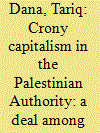

|
|
|
|
|
| Summary/Abstract |
This article interrogates the multifaceted political–economic networks entrenched within the multiple structures of the West Bank-based Palestinian Authority (PA). The main argument of this article is that crony capitalism is a defining feature of the PA’s relations with a handful of capitalists and business groups. The demonstration of this argument is exhibited through the large-scale public and private monopolistic practices in strategic sectors of the Palestinian economy, which function within the framework of Israel’s settler-colonial reality and the persistent patterns of international aid to the occupied West Bank. While acknowledging the existence of cronyism as a feature of the capitalist system in its diverse typologies, crony capitalism may be more pronounced in situations characterised by political uncertainty, whereby political–business collusion strategizes the expansion of neo-patrimonial networks and rent-seeking opportunities as a meta-mechanism for social control and political stabilisation. In the Occupied Palestinian Territories, crony capitalism was developed as part of the political allegiances and economic alliances that underpin the structures created by the Oslo process, which are fostered by Israeli policies and the international donor community to maintain the cohesiveness of the PA regime.
|
|
|
|
|
|
|
|
|
|
|
|
|
|
|
|
| 4 |
ID:
173920
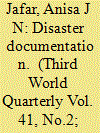

|
|
|
|
|
| Summary/Abstract |
This study investigates clinical practitioners’ use of medical documentation during sudden-onset disasters in order to better understand how we can improve practice. Thirteen participants, representing nine nationalities and six clinical disciplines (with the collective working experience of at least 15 different organisations providing disaster response), underwent semi-structured interviews using an inductive approach based in grounded theory. The initial codes and themes were analysed over four coding rounds and developed into selective codes. The findings suggest that documentation is overwhelmingly de-prioritised in disasters due to competing demands; there is little incentive to complete documentation at an organisational or government level; practitioners acknowledge the importance of and need for adequate documentation; paper documentation still has its place whilst electronic approaches have both benefits and drawbacks; and disasters require bespoke documentation solutions. Development of the emergency medical team (EMT) ‘data management’ role within EMTs may be one way to focus teams on key areas of improvement.
|
|
|
|
|
|
|
|
|
|
|
|
|
|
|
|
| 5 |
ID:
173922


|
|
|
|
|
| Summary/Abstract |
There is a common tendency to observe a process of homogenisation when the current international structure is analysed. However, the globalisation process embraces heterogeneities and contradictions stemming from the integration of different states into a single global structure. This article explores the role and motivations of domestic social classes in creating variations in the form of integration of their states into the global whole. It takes one of the odd cases at the centre of inquiry and particularly concentrates on the emergence of alternative forms to the neoliberal globalisation in the process of Iran’s integration into the global capitalism. The accumulation strategies adopted by the dominant class factions in Iran are investigated in order to reveal their dialectical relationship with the international capitalist structure. Their role in the international political economy of Iran demonstrates how social agents through their strategic activities create variations in the forms of integration into the global capitalism. The article compares the Iranian case to the varieties of integration of lately capitalised but not peripherised BRICS (Brazil, Russia, India, China and South Africa) states. This aims to reveal that whilst these countries have truly integrated into the global capitalist system, the internationalisation of their states contradicts the accumulation strategies of their dominant classes.
|
|
|
|
|
|
|
|
|
|
|
|
|
|
|
|
| 6 |
ID:
173914


|
|
|
|
|
| Summary/Abstract |
Recently there have been calls from policymakers around the world for practically engaged research to produce evidence-based policy for peace, security and development. Policymakers aim to align three types of methodological approaches to knowledge about peace, security and development in international order: methodological liberalism at state and international levels, aligned with ‘methodological everydayism’ in order to constrain methodological nationalism. Policy operates through broad forms of intervention, spanning military, governmental and developmental processes, which scholarship is expected to refine. Critical scholarship is sensitive about the subsequent ‘interventionary order’, often connecting methodological everydayism with global justice frameworks rather than methodological nationalism or liberalism.
|
|
|
|
|
|
|
|
|
|
|
|
|
|
|
|
| 7 |
ID:
173915
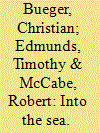

|
|
|
|
|
| Summary/Abstract |
Maritime security capacity-building is a growing field of international activity. It is an area that requires further study, as a field in its own right, but also as an archetype to develop insights for capacity-building and security sector reform in other arenas. This article is one of the first to analyse this field of activity. Our empirical focus is on the Western Indian Ocean (WIO) region. Here, international actors have launched multiple capacity-building projects, initially in response to Somali piracy. We document the significance, extent and variety of capacity-building activities in this region and examine the ways in which capacity-building at sea has incorporated innovative characteristics that develop and expand the capacity-building agenda as traditionally understood. Our conclusion highlights the need to pay more attention to the maritime domain in international security and development studies and considers ways in which the maritime capacity-building experience may offer important lessons for other fields of international policy.
|
|
|
|
|
|
|
|
|
|
|
|
|
|
|
|
| 8 |
ID:
173919


|
|
|
|
|
| Summary/Abstract |
The Korean government has strategically promoted the country’s development assistance policies as an alternative to traditional donors’ failed development promises and disguised neo-imperialist policies. This article questions the adequacy of fit between this narrative of exceptionalism and the reality of Korea’s developmental policy prescriptions. Based on field interviews and an analysis of policy recommendation reports produced by the Economic Development Cooperation Fund’s Knowledge Sharing Program, this article shows that Korea is actually ‘kicking away the ladder’ by offering neoliberal prescriptions that are much more in line with global developmental liberalism than its own promotional narrative suggests. Korea is merely aligning itself with the global development status quo. But these prescriptions ease chaebols’ entry in developing markets and contribute to exporting an oppressive chaebol-led transnational labour regime, notably in the Philippines.
|
|
|
|
|
|
|
|
|
|
|
|
|
|
|
|
| 9 |
ID:
173913
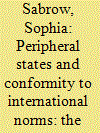

|
|
|
|
|
| Summary/Abstract |
This paper seeks to understand the seemingly paradoxical behaviour of states of the Global South, which on one the hand conform to transnational norms in order to integrate into the international society and on the other hand (sometimes simultaneously) differentiate themselves from them. To that end, this article develops the dilemma of the marginalised in order to show that conformity and differentiation become two paradoxical strategies for marginalised actors to pursue the same goal: equality with powerful states. The transformation of the Organisation of African Unity to the African Union, where significant changes in Africa’s policy vis-à-vis global powers took place, serves as a case study to illustrate how marginalised actors struggle between conformity and differentiation in order to claim their place in the international arena. It also shows how the dilemma of the marginalised can be compelling to help us understand the predicaments of marginalised actors across vastly different situations of structural inequality. Acknowledging the dilemma helps us understand their behaviour rather than to dismiss it as irrational, thereby recognising Third World agency in shaping the international system.
|
|
|
|
|
|
|
|
|
|
|
|
|
|
|
|
| 10 |
ID:
173921
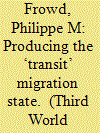

|
|
|
|
|
| Summary/Abstract |
Despite a growing interest in transit migration and border controls along migration routes, there is relatively little work on the production and operation of the category of ‘transit’ itself. This article investigates how Niger emerges as a country of migration ‘transit’ and what impacts this categorisation has had on security and development interventions targeting the country. Building from the literature on the governance of transit migration and on the ‘migration state’, this article theorises transit as a political label. It argues that Niger’s status as a transit country is constructed through a ‘polyvocal’ process involving the discourse and everyday assumptions of international and local actors. The article locates this shared understanding in official texts, everyday routines, and sub-state diplomatic practices. It goes on to argue that these framings, despite divergent rationales, have effects visible in the evolution of security intervention in Niger. These include shifts in the location of border security, the blurring of migration into other transnational threats, and the creation of new domestic institutional practices. The article contributes to theorising the political construction and specificity of transit-ness and provides a fresh case for the research agenda on inter-state relations around migration governance.
|
|
|
|
|
|
|
|
|
|
|
|
|
|
|
|
|
|
|
|
|